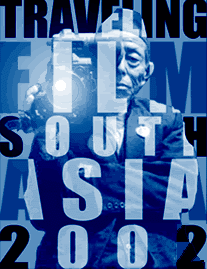|
|
 |
|
|
Travelling Film South Asia 2000 The first-ever South Asia-wide coming together of non-fiction films was in September 1997, with Film South Asia '97. That celebration of the South Asian documentary was so successful that the organisers (Himal magazine and the non-profit Himal Association) decided to make it a regular affair. That is how Film South Asia '99 happened, bringing together the best of subcontinental documentaries made since 1997. The lineup of more than 50 documentaries offered at FSA '99, held in Kathmandu from 30 September to 3 October 1999, proved that the Subcontinent is producing "more and better documentaries", as a member of the screening committee put it. That quote was quickly up on the marquee as festival's slogan. The organisers of FSA '99 were overwhelmed by the response to the call for entries, in terms of number, variety, as well as - most importantly - quality. Confronted with the challenge of choosing 52 films from the 149 entered, the selection panel made its final list on the basis of overall excellence, while giving some consideration to thematic diversity and geographical spread. Among the films screened at the FSA '99 venue in downtown Kathmandu, 13 could be roughly classified as social commentary, 10 as reportage, 10 as personality profiles, six on women and children, five political/ historical, four ethnographic, and four 'others'. Country-wise, 33 films were from India, five from Bangladesh, five from Nepal, four from Pakistan and one from Sri Lanka. India was well represented at FSA '99, for obvious reasons of size, economy and its advanced media culture. At the same time, it must be noted (and this applies beyond documentary films) that the key to being 'South Asian' does not lie in representing the nation-states; rather the populated regions of the Subcontinent. Going by this criterion, the 52 films of FSA '99 did a fairly good job of covering the entire region, from Assam to Sindh, Sikkim to the Sri Lankan coast. The three-member jury was composed of internationally acclaimed director Goutam Ghose of Calcutta, actor-director Salman Shahid of Lahore and critic and scholar Neloufer de Mel from Colombo. The jury awarded the prize for Best Film jointly to No One Believes the Professor by Farjad Nabi of Lahore and Thin Air by Ashim Ahluwalia of Bombay. The second prize went jointly to Pure Chutney by Sanjeev Prakash of Miami, and Three Women and a Camera by Sabeena Gadihoke of Delhi. Buddha Weeps in Jadugoda by Sriprakash of Ranchi received the third prize. The Forgotten Army by Kabir Khan of Delhi was awarded the Grand Jury Prize and Do Flowers Fly, a short film by Prosenjith Ganguly of Calcutta, received Special Jury Mention. Continuing our efforts to popularise South Asian documentaries all over South Asia and the world, this time too we are sending 15 outstanding films of FSA '99 on a tour as part of Travelling Film South Asia. This will give film enthusiasts in distant cities and communities the opportunity to enjoy and evaluate the latest and finest documentaries from the Subcontinent. These 15 films, selected with the help of the festival jury, offer an in-depth review of pressing South Asian concerns in the arenas of culture, lifestyle, history, politics, activism and environment, while also providing the audience a window on the state of the art of documentary-making in the Subcontinent. As TFSA tours South Asia as well as North America
and Europe, Himal Association and Himal magazine are confident that
the travelling show will make a robust contribution to building
up a global constituency for the South Asian documentary.
Travelling Film South Asia P.O. Box 7251, Kathmandu, Nepal Phone: +977-1-543333/542544, Fax: +977-1-521013
|
